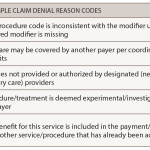A single-center study of prior authorization in rheumatology found that 71% of 225 patients required prior authorization to begin infused medications—despite the fact that 96% of the prescriptions were ultimately approved.2 Even those patients eventually approved for treatment had a higher burden of steroid use because of delays in approval of prescribed medications.

Dr. Feldman
“There is no uniformity in the list of drugs requiring prior authorization among and within various health plans,” says Madelaine Feldman, MD, FACR, president of the Coalition of State Rheumatology Organizations (CSRO) and a rheumatologist in private practice with The Rheumatology Group, New Orleans. “That confirms there is little science behind these requirements, particularly when we see generic steroids requiring prior authorization. It is purely a delaying tactic that results in harm to the patient and an unnecessary burden to the physician’s office.”

Ms. Ruffing
Rheumatology nurse Victoria Ruffing, RN-BC, director of nursing and patient education for the Johns Hopkins Arthritis Center and adjunct faculty at the Johns Hopkins School of Nursing, Baltimore, says variations in the prior authorization process create delays for practices and patients. Not all medications require prior approval. It’s complicated and variable, she says.

Ms. Zlatkus
“Some payers include quantity limits in the prior authorization based on a patient’s current weight instead of a prior authorization for mg/kg,” says Andrea Zlatkus, CMPM, CRMS, CRHC, executive director of the National Organization of Rheumatology Management, Wilmington, N.C. “Therefore, if you have an authorization for a specific number of vials and the patient has a weight adjustment, you may not be able to change the dose because it requires an updated authorization. This is something many nurses struggle with because it goes against their training.”
Every year, a PBM may rework its formulary—with new financial incentives for preferred drugs. A medication previously denied may now be preferred, Ms. Ruffing says. “So we have to rework our medical plan for the patient. Or the patient gets switched under their employer’s health benefits to a new insurance company.”
There’s always a deluge of recertifications required in January, when many patients switch insurance companies. And prior authorization approvals that were granted for a year or two can be overturned when circumstances change, requiring a new round of recertification.
In the case of denial, the provider must start the appeal process. Not all insurers issue denials for the same reasons. “The insurance company may say, ‘Drug B must have failed to improve the patient’s condition before we will consider the prescribed drug,’ ” says Ms. Ruffing. “However, approval for Drug B isn’t guaranteed. It’s not uncommon to receive a second denial, stating, ‘Before you try Drug B, you have to try Drugs C and D, and they have to prove ineffective, too.’ ”


